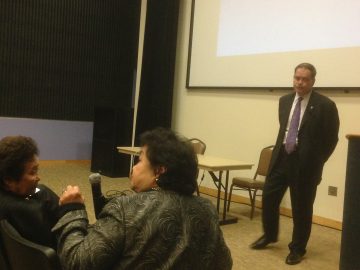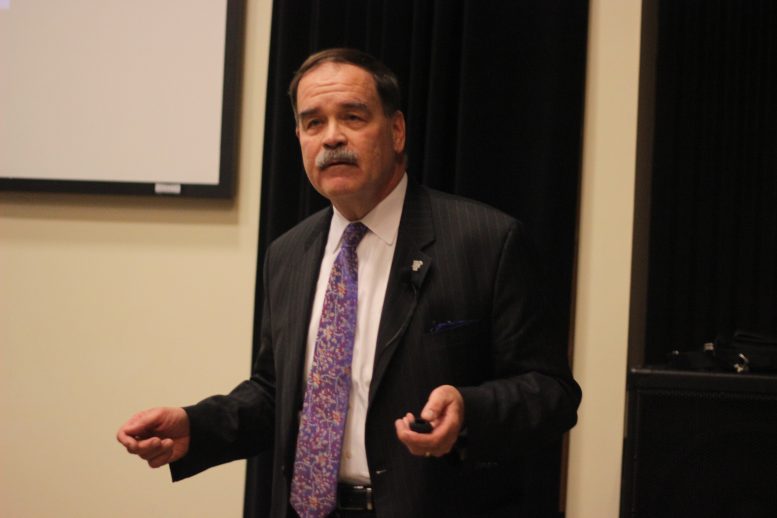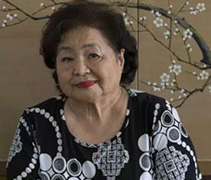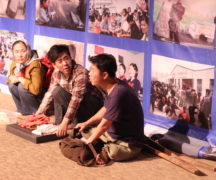By DAVID DUPONT
BG Independent News
It took a global community to help North Korea become the international, nuclear-armed pariah it is today.
Thomas Snitch, an expert in nuclear armaments and diplomat whose career dates back to the early days of the Reagan Administration, returned to his alma mater, Bowling Green State University, Monday to detail how North Korea became the global threat it is today.
His talk was the opening event in the “Seeking Peace in the Nuclear Era: A Peace Symposium” which continues through Thursday.
Try as Snitch might, he could offer little solace to those like one woman who said she wouldn’t be able to sleep that night after hearing his analysis.
And, after delivering the Nakamoto Peace Lecture, Snitch faced criticism from another distinguished guest at the symposium.

Setsuko Thurlow responds to Thomas Snitch’s talk on North Korea’s nuclear program.
Setsuko Thurlow, who will speak Wednesday night with a fellow survivor of the Hiroshima bombing, said Snitch spoke too little of the United States’ responsibility for initiating nuclear war, and too little of how the world can work to eliminate nuclear arms.
Impassioned statement Thurlow spoke about her experiences with the horrors of nuclear war. There was a double standard she said with the five nuclear powers having their own arsenals but telling others they should not have them.
There are 15,000 nuclear weapons in the world, she said, and 95 percent are in the hands of Russia and the United States.
That has a positive side, as Snitch noted earlier in his speech. Those countries, which have reduced their arsenals, are among those who have the best safeguards to prevent accidental launches. Just recently NORAD radar in Colorado picked up a strange mass over the western United States. It wasn’t missiles. It wasn’t birds, like those that almost triggered a Soviet Union missile launch in 1983. It turned out to be butterflies, 21 million butterflies.
Would North Korea, or Pakistan, be able to exercise such restraint?
Snitch started his talk by mentioning that the front page of that morning’s Washington Post had a story on how to survive a nuclear attack on Washington.
The North Koreans, have declared that they will not enter talks until they have a missile capable of hitting the Eastern seaboard of the United States.
Snitch said when the Soviet Union collapsed, many of its nuclear scientists were now free agents, and though NATO tried to employ as many as possible, others found their way to places like North Korea.
But North Korea had started before that. Snitch remembers being called into the White House not long after Ronald Reagan took office. Snitch was asked to identify something in a fuzzy photo. He looked hard. It was a Soviet-made nuclear reactor. The next day he was called back in, and asked what was missing – power transmission lines.
The government confronted the Soviets. The Soviets though said they weren’t involved, but they confirmed U.S, intelligence. North Korea was seeking to build a bomb.
Reagan was told. How long would it take them? At least 25 years. Why, Reagan responded, should I worry about it?
That attitude, Snitch said, reflected the U.S. approach to North Korea for too long. With so many other problems, North Korea was left on the back burner.
As with the reactor, which could have been used to generate electric power, the technology that the North Koreans needed to create nuclear weapons was often dual use.
Pipes for fertilizer plants work well for nuclear reactor, because they are built to handle extremely corrosive material. Compressors designed for the auto and airplane industry were also utilized for nuclear production.
This technology largely came from the United States and the West, often shipped in false flagged ships, and never with certificates saying where it was going and for what purpose.
This all costs, he said, “tens of billions of dollars.”
Why did North Korea need printing presses? Yes, they needed them to print their own currency, but North Korea also has “the world’s best counterfeiters.”
He said he never accepts a crisp, brand new U.S. $100 in Asia because he’s almost certain it was printed in North Korea.
North Korea also is a large producer of drugs, both fentanyl and Ice, a highly purified form of methamphetamine.
Recently the Egyptian government apprehended a ship carrying $300 million in small arms from North Korea. Those weapons were destined for Egypt’s own military, and were paid for with U.S. military aid.
Shrimp caught in China and labeled as produce from China and sold in WalMart and Costco, is actually processed in North Korea.
And North Korea sends its people abroad to work, and 90 percent of the wages they earn are garnished by the government. “It’s essentially slave labor,” Snitch said.
That’s why dictator Kim Jong-il and the upper echelon can drink VSOP cognac, drive Mercedes, and develop a nuclear arsenal.
They continue testing missiles, including firing some that land near Japan. One has gone 2,300 miles in the air.
The North Koreans now have about two dozen nuclear warheads, at sites around the country, hidden in tunnels.
“If you’re going to get 24 warheads, you better get them all at once,” he said. “My greatest fear is there’s one on a tramp steamer. That’s what scares me to death.”
There are options, few good. Sanctions, he said, do not work. And trading insults like calling Kim Jung il “Rocket Man,” only further alienates the North Koreans who want respect.
Abrogating the Iranian nuclear deal is also counter-productive, he said. Why would anyone want to negotiate with a country that will then turn around and break the deal it made?
Also, getting out of trade partnerships with Asian nations only weakens our allies in the region.
The U.S. is more and more isolated within the United Nations with even staunch allies such as the United Kingdom distancing themselves.
And the Trump Administration has been very slow in filling top jobs at the State Department and Department of Defense.
After “40 years of neglect” the road to peace will be difficult, Snitch said.
When the North Koreans have a missile capable of hitting the continental United States they will begin to talk.
And when they do, it will cost to make a deal. The last United States deal with the North Koreans, which failed, cost $500 million. The next will be more expensive.
Snitch has little hope for regime change. China does not want the flood of refugees that conflict would bring, and Snitch doubts whoever emerged as the new leader would be any better. “They are all creatures of this system.”
Ultimately, the world community may have to accept North Korea as a nuclear power.
As much as he and peace activists may want to eliminate nuclear arms, he said. “The genie is out of the bottle. I tried my whole life to put it back in.”
The Peace Symposium will continue with a talk by journalist and historian Gwynne Dyer tonight (Tuesday, Oct 17) at 7:30 in room 228 of the student union.
Sesuko Thurlow and Keiko Ogura, also a Hiroshima survivor and peace activist, will speak Wednesday at 7:30 p.m. in the student union theater, and on Thursday they will make a presentation at 4 p.m. in the Wood County Public Library’s Carter House, 307 N. Church St. in Bowling Green.



